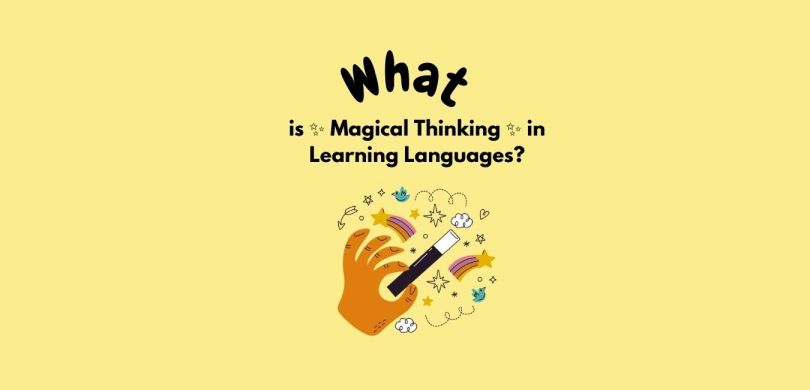Dear English learner,
I know that learning a new language can be challenging, and sometimes it’s tempting to look for quick fixes or magical solutions that will make everything easier. Unfortunately, this type of thinking can actually hold you back from making progress in your English learning journey. In this post, I’ll explore what magical thinking is, why it can be problematic, and how to avoid falling into its trap.
What is Magical Thinking?
Magical thinking is when someone believes that two things are connected, even if there is no logical reason for them to be related. For instance, if you think that wearing a lucky charm will help you pass a test, even though there’s no proof to support that idea, then you’re using magical thinking.
It’s important to remember that believing in things like lucky charms, mantras, and positive thoughts won’t necessarily help you achieve your goals. To succeed in learning English, it’s better to focus on practicing regularly and using effective learning strategies.
When it comes to learning English, magical thinking can take many forms. Some examples include:
- Believing that grammar is not important and that you can become fluent just by speaking with native speakers or watching TV shows.
- Some people believe memorizing grammar rules or vocabulary lists will make them fluent, but this is not enough.
- Thinking that you’ll magically “get it” one day, without putting in the necessary time and effort to study and practice.
- Expecting that you’ll become fluent in a matter of weeks or months, rather than accepting that language learning is a long-term process.
- Assuming that you’ll understand everything perfectly once you’re immersed in an English-speaking environment, without realizing that confusion and misunderstandings are a natural part of the learning process.
- Assuming that you’re too old or too “bad at languages” to learn English, without giving yourself a chance to try and improve.
- Assuming that it is normal to be confused ALL the time.
- Assuming that an advanced English level class will help you learn faster because one day you will magically grasp the basics of the language that you can easily and smoothly learn in a lower level class.
In a nutshell: Magical thinking is when people think they can learn a language quickly without much effort.
Why is Magical Thinking Problematic?
Magical thinking can be problematic 2 main reasons:
1 Unrealistic expectations
Magical thinking can lead to unrealistic expectations and disappointment when things don’t go as planned. If you believe that you’ll become fluent quickly and easily, and then find yourself struggling with grammar or vocabulary, you may feel frustrated and demotivated.
2 Laziness
Magical thinking can prevent you from taking action and making progress. If you believe that there’s a magical solution to your language learning challenges, you may not be willing to put in the necessary time and effort to study and practice. As a result, you may not make the progress you’re capable of and may miss out on opportunities to improve your language skills.
How to Avoid Falling into the Magical Thinking Trap
To avoid falling into the magical thinking trap, it’s important to have a realistic and growth-oriented mindset. Here are some tips to help you:
- Recognize that learning a language is a long-term process that requires time, effort, and practice. Don’t expect to become fluent overnight, and be willing to invest in your language skills over time.
- Focus on the process of learning, rather than the outcome. Instead of obsessing over how fluent you are or how many words you know, focus on enjoying the learning process and making incremental progress.
- Don’t be afraid of making mistakes or feeling confused. These are natural parts of the learning process, and they’re actually signs that you’re challenging yourself and making progress.
- Seek out resources and support that can help you improve your language skills. This could include textbooks, online courses, language exchange partners, or a tutor.
- Stay motivated by setting realistic goals and celebrating your progress along the way. For example, you could set a goal to learn how to use five new words each week, and then celebrate when you achieve this goal.
Don’t let magical thinking hold you back from achieving your language learning goals.
Language learners must practice speaking, reading, writing, and listening regularly. It’s also important to use various resources, like books, podcasts, and news articles. Avoid thinking that one method or tool is all you need for success. Remember, everyone learns differently. It’s good to practice speaking with English speakers, even if you make mistakes.
Wishing or visualizing won’t make you learn faster. The most effective way to learn is to study and practice consistently.
Remember that there are no shortcuts or magical solutions – the key to success is hard work, dedication, and consistent practice.
With love,


